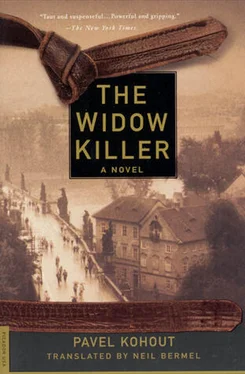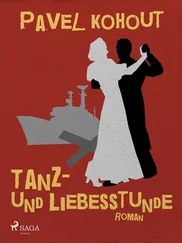Over the years, many men had vied for her favor; now their time had come. She found a new game: men, she learned, fell head over heels in love with her. She managed to convince each of them that he was her chosen lover, while his competitors were no more than a pretext. If she had learned anything perfectly, it was how to pretend passion and to lie. Let Buback beware! For none of these men had been able to give her the pleasure she faked so expertly.
Then she met Martin again.
This time he came to Hamburg on tour, and she fretted over how to behave. Avoid him? Confront him? He solved the problem for her. When he spotted her, he came over and greeted her affably, as if they were close friends. He asked if he could invite the two of them to dinner. And she lied to him, saying Hans was not in town, but she would gladly join him. Martin was staying, of course, in the luxurious Hotel Atlantic; they feasted on lobsters with French wine, and then he returned to their old story. He hadn’t been able to accept her refusal at the time; he could laugh at it now, but she had been the first woman to turn him down at fifty. For two years he was devastated, until fortunately he met Ursula. She was Grete’s age, and that helped him get over it.
She laughed along with him, but felt miserable. Suddenly all the time she had wasted with Hans hit her full force — she could have spent it with this enchanting man, whose skin was just like Hans’s, and his eyes even younger! Soon the hotel carriage would come to take her home; she nearly wept at the thought.
Once they had explained everything to each other, he asked if he could invite her to his suite afterward. There was champagne on ice waiting for him there every evening. In the elevator she decided to be his lover.
“And this fellow I had written off three years earlier as an old man was the first to bring me to a climax and keep me there all night — like you, Buback…. Why do you look so embarrassed when I praise you? Come make love to me instead.”
He was only too glad to obey, but her past was beginning to affect him. Why? Hard to be sure, but he felt a strong urge to keep his own a secret. Once, he confessed the short but strong burst of feeling he had had for the Czech girl. The restaurant fiasco had done him more good than harm, he declared, because it broke down his defenses and led him from an imaginary lover to a real one. She laughed.
“So I was a consolation prize! I’ll make you pay! You’ll never have me again!”
He took it as a joke, but when he tried to make love to her again, she crossed her thighs and locked them together. He tried to overpower her; after all, he was sixty pounds heavier and had wrestled. But she thrashed about in his grip; he could not grab her hands or open her legs. He could not even roll her onto her back, because she would wriggle deftly from side to side. Gasping for breath, he talked to her, begged her, warned her he would hurt her. Just before he crossed the line into brute violence, he gave up. His week of euphoria over, he lapsed into a deep depression. He remembered the men she had teased and led on, and felt sure she had written him off for good. Had she gone back to Meckerle? After all, she hadn’t shown up the night before…. Silently he released his grip so she could get up. Instead he was suddenly in her embrace.
“Come on! Make love to me. Buback! More than ever!”
Much later, when she seemed far more passionate about her cigarette than about him, he dared to ask why his truth, in contrast to hers, had deserved punishment.
“Your fateful love was Hilde; mine was Martin. The rest of them don’t belong here.”
Another thing confused him. It could happen at any time, except when making love — they could be listening to music, eating a meal, or just talking. Suddenly, she seemed to back away from him. A strange, bitter smile would appear on her face, and her mood would change as abruptly as the fickle weather of Sylt, where warm stillness gave way in seconds to an icy gale. When he mentioned it, she snapped irritably that nothing was wrong; she wasn’t moody, just thinking! After all, she couldn’t giggle at his every comment like an imbecile. If he wanted to stay with her — which was up to him — he should stop trying to force her to explain things and learn to deal with her as she was.
He asked himself why he should bother with the whims of this woman, when their only connection was a mutual need to dull the pain of irreplaceable loss. He got his answer one night when she failed to show up. Although it was his first chance at a good night’s sleep in days, he stared for hours into the darkness and tried to conjure up the sound of quick footsteps on the side staircase. With Hilde he had been a good husband; with Grete he was a complete man again. But he didn’t feel like much of a man at the moment. There was no point in drawing it out: if she wouldn’t explain why she stood him up, he would end it.
But the next night, when she ran up the stairs to his door, his need overwhelmed everything else. And when she hungrily kissed him like before, he lost his desire to ask the question. So she continued to come or sometimes not to come, when she supposedly wanted to be alone, and when she came, she drank, smoked, talked, and made love to him even more insistently. Then, by the time he returned from the shower she was asleep again, as if deep in thought, chin propped on the back of her hand.
Today, he dived into the bathtub, not knowing if he would see Grete or not, and took stock of their time together. He had known her less than thirty days, and yet she had altered the very fabric of his existence. She lent it meaning, he admitted; she gave him a goal, even if for now it was only to wait for her.
Like before in Dresden, in the days of his professional innocence, he studied the reports of potential widow killers on a daily basis. First he would listen as the translators summarized them for him, then later, with the office door locked, he would read the Czech originals over in detail. He consulted with Morava and his group as to what was and was not worthy of investigation, and meanwhile, diligently and unfalteringly as a barometer, measured the pressure and temperature in the ranks of the Czech police. This morning for the first time he would be able to satisfy Meckerle’s curiosity.
“If there’s a rebellion, the Czechs’ trump card will apparently be the radio, Standartenführer.”
“No kidding,” his boss snorted in contempt. “Now there’s an idea. Radio’s been a target since the day it was invented.”
“I don’t mean the Protectorate radio station; a couple of tanks and a round of grenades will take care of it. I mean the city radio station.”
“And what’s that?”
“The central office for civil air-raid defense under the Prague police. Besides the sirens, it can patch through to all the public loudspeakers in the city.”
“Wouldn’t one tank and a single regiment be more than enough?”
“For the office, yes. I’d assume the Czechs are clever enough to broadcast by telephone from any local switchboard.”
“Aha,” Meckerle mused. “So what then? Cut the connections?”
“We could turn them off from the main post office, but then we’d be risking our own people’s lives; we don’t have a separate warning system.”
The giant leaned forward in his chair and thumped his elbows down onto the table, which indicated he expected his subordinate to make a suggestion.
“So, then.”
“With your permission I’ll ask our technicians and their Czech colleagues to check the state of the equipment across the entire city grid. Our agent will be there to map out all the stations. Then he’ll hand over a precise plan to the SS officer you designate, who will put together units that can occupy or decommission all the radio transmitters at once when the time comes.”
Читать дальше












